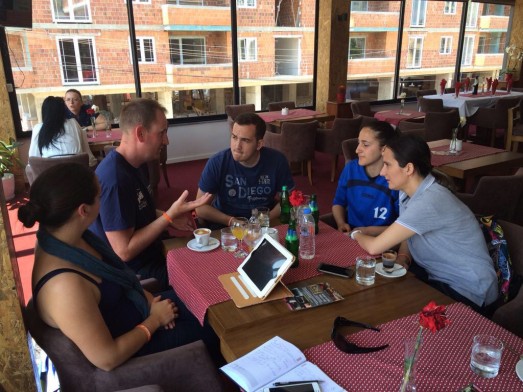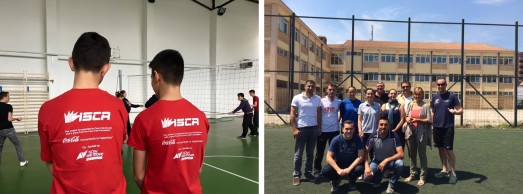ISCA’s MOVE Transfer programme the focus of a new study
27/07/2017
Photos: StreetGames UK transferred its award-winning Doorstep Sport Clubs to Kosovo. (Great ideas are best exchanged across borders and over a good cup of coffee.)
The International Sport and Culture Association’s MOVE Transfer International programme is now the focus of an academic study on whether and how civil sports organisations can benefit from cooperating and sharing knowledge across borders on specific health promoting sports projects. Danish student Elin Mogensen dedicated her master’s thesis in sports science to the MOVE Transfer International (MTI) programme, selecting two transfer processes as her case studies.
Elin’s interest in ISCA’s work arose in 2015 when she saw ISCA President Mogens Kirkeby and External Relations Manager Marvin Radford present at the Play the Game conference. Less than a year afterwards, Mogens became her ‘mentor’ when ISCA and Elin made an agreement to cooper-ate on the research for her thesis. Now, Elin has finished her thesis. The full version is in Danish, and here she shares a summary of her findings in English.
The background to my study Is there potential in sharing knowledge across borders? A multiple case study on collaborative health promoting projects among physical activity providers is that non-communicable diseases such as cardiovascular diseases, depression and diabetes are a major global problem. These diseases are to a large degree caused by people’s lifestyles, which are increasingly characterised by a low level of physical inactivity. As a result, there seems to be great potential in working to increase physical activity levels in order to improve public health. My thesis focuses on the potential of civil sports organisations in working together, as they have a key role in health promotion due to the direct access they have to citizens and the high number of members and volunteers they engage in their activities.
Research shows that sports organisations are challenged when they try to develop and implement health promoting projects, even though there are many good practices that exist around the world. Using this research as a starting point, my thesis questions whether sports organisations can benefit from knowledge sharing and cooperation on health promoting projects to improve their work. ISCA’s MOVE Transfer programme is specifically aimed at facilitating the transfer of good prac-tices from one organisation and setting to another (within one country or internationally).
Therefore, by taking ISCA’s MOVE Transfer as an example, the study examines the outcome of particular sports organisations’ participation in a process where the purpose is to transfer knowledge and experience from health promoting projects for hard-to-reach populations across countries. A “sender” and “receiver” organisation is involved in each process but the thesis focuses solely on the outcome that the receiver organisation gets from participation. This involves a multiple case study of two collaborative partnerships from the MOVE Transfer International (MTI) programme. The main purpose of MTI is to create a framework in which projects can be transferred regardless of language barriers and cultural, economic and political differences. At first glance, it seems like a brilliant idea, because it could save time from “reinventing the wheel” or trying to come up with new things when good ideas and well-established projects can instead be shared, transferred and adapted into other contexts. But is this really possible?
To find out if it’s possible to make the kind of transfer that MTI aims for, the research methods I used for my thesis were an analysis of in-depth qualitative interviews with representatives of the organisations involved and a range of different documents such as emails, reports and minutes from meetings. These were examined from a phenomenological perspective to understand how the organisations regarded the impact of the process from their perspectives. The phenomenological approach was combined with hermeneutical analysis of the experienced reality. The two partnerships involved were the British organisation StreetGames, which attempted to transfer its well-run project “Doorstep Sports Clubs” to the Independent Organisation of Sport Education (OESK) in Kosovo and Deutscher Turner-Bund (DTB), which tried to transfer its comprehensive programme “Active Age” to Czech Sokol Organisation (COS). The transfer process took place between 2015 and 2016.
As a theoretical framework, I used Everett Rogers’ theory “Diffusion of Innovation” to create a model using defined variables to clarify the results. The results of the study show that the receiver organisations discovered that the projects running in other countries addressed challenges that overlapped with the challenges they faced in their own work. They were introduced to what they regarded as innovative approaches to increasing the physical activity levels among specific target groups. For example, a representative from OESK commented that “it was something new for us because they do it very different in England than we do here”.
The receiver organisations became more open to changing of their ways of working with their target groups when they began to implement their new projects under the guidance of the sender organisation. In both cases, the new projects were created with inspiration from the original projects, but they were also adapted to the receiver organisations’ own needs, resources and circumstances.
“We will develop the same activities or adapt ones for our hard-to-reach populations, adapting to the context of our country or organisation,” a representative from OESK explained.
In connection to that, a representative from COS underlined that it is important to be flexible and customise the activity when you try to transfer it from one setting to another: “You simply cannot transfer everything mechanically from one organisation to another one. Each of them has certain specifics regarding the organisation, the finances, recruiting, education of instructors and so on."
The results further show that there were big differences in the extent to which the two receiver organisations implemented and disseminated the new projects within their organisation. One organisation applied the new project fully, though at a smaller scale. The other organisation applied aspects of the new project, but had far from finished the development and implementation of the new project by the time the 18-month MOVE Transfer process ended. None of the projects were widely disseminated or anchored into the organisations’ operations due to financial, organisational and political challenges, but both organisations were motivated to keep working with the belief that they would implement and disseminate the projects more in the long term.
“Formally, the MTI finished, but we will develop our project and go on with it and the cooperation with DTB. There are some reserves still, which we will try to complete in the future,” the representative from COS explained.
In addition, the receiver organisations experienced that they had a close working cooperation with the sender organisations, which they could benefit further from in their work.
“We appreciate DTB as a strong partner and the cooperation in the future will be most important for us. Some concrete themes have been defined already, some can be defined later,” the representative from COS added.
The receiver organisation in Kosovo experienced that simply embarking on an international transfer was enough to attract attention among stakeholders in their community, so dissemination was not so much of a challenge as in the bigger countries.
“In Kosovo, we are only two million people, it’s a small country. So when one organisation does something, everybody hears,” the representative from OESK said. That being said, OESK was struggling to anchor the project in their local communities and very aware that patience is a virtue when establishing a new programme.
Overall, the results of the thesis support studies which argue that there is great potential in knowledge sharing if 1) attention is paid to the context in which the project is implemented and adaptations are accepted, and 2) if it is recognised that the process is characterised by uncertainty, meaning that particular results cannot be expected as the transfer is a test of whether a project can work in a different setting.
But the area of study is still in its infancy, and the results here apply specifically to cooperation across particular countries and sharing of knowledge from practice-based evidence. This is a combination that has not been explored in existing literature, but there is still plenty of room to expand on these findings. Each MOVE Transfer process reveals new experiences that we can learn from – so why not explore them, and similar processes, a little further?
Writing my thesis in cooperation with ISCA and on this particular topic was very interesting for me and I will bring along the knowledge I have gained in my future work in the sports field. If you would like to read or find out more about my thesis on ISCA’s MOVE Transfer programme, please contact me at elinmogensen@hotmail.com.
The first funded period of the MOVE Transfer project (supported by the Coca-Cola Foundation) ended in 2016, and the MOVE Transfer methodology is now being used in an EU-supported pro-ject in which ISCA member the Sports Union of Slovenia is transferring its Healthy Clubs model to Bulgaria and Malta. ISCA aims to facilitate similar transfers of good practices between its members as future opportunities arise. Please contact ISCA at info@isca-web.org for more information, or click here to apply for membership.





